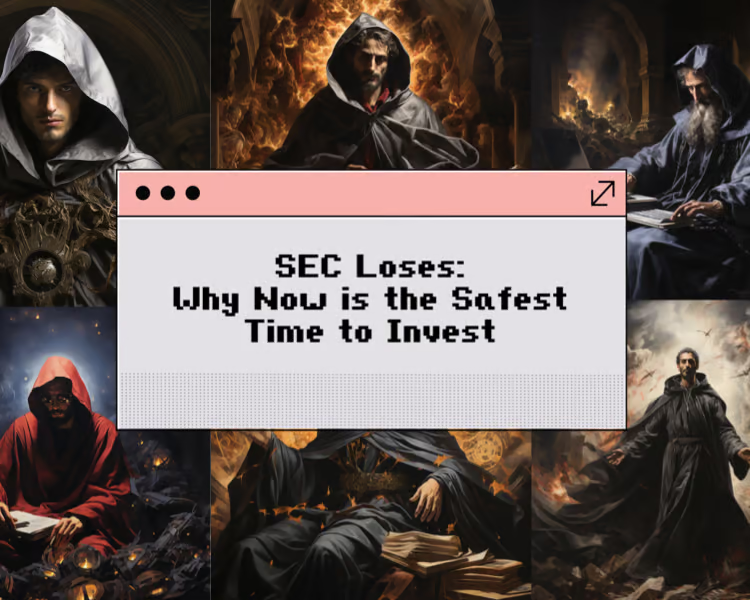Navigating the Regulatory Maze: The SEC and the Crypto Industry’s Battle for Clarity
As the watchdog of financial markets, the Securities and Exchange Commission (SEC) has increasingly turned its focus to the evolving cryptocurrency industry.
Under Chairman Gary Gensler, the agency’s track record has been rife with courtroom losses against crypto behemoths like Ripple Labs and Grayscale Investments.

These setbacks not only indicate that the SEC’s regulatory approach may be intentionally hampering the industry but also hint at a larger struggle within the SEC to adapt to a rapidly changing market landscape.
Grayscale and the Dawn of Bitcoin ETFs: A Regulatory Milestone and a Wake-Up Call for the SEC
Grayscale Investments recently scored a major win in its quest to turn its Bitcoin Trust into an Exchange-Traded Fund (ETF).
The legal victory came after a federal appeals court overruled the Securities and Exchange Commission (SEC), which had earlier denied Grayscale’s application on the grounds of “investor protection”.
This court decision marks a turning point for not just Grayscale, but for the cryptocurrency industry as a whole.
It’s like a crack in a dam that had been holding back a reservoir of innovation and investment opportunities.
The court’s ruling doesn’t just open the door for Grayscale; it sets a precedent that other Bitcoin ETFs could follow.
It’s somewhat akin to the moment when streaming services first started getting Emmy nominations.
Just as that signaled a shift in how quality television could be delivered, this ETF approval hints at a new era for cryptocurrency investments.
You don’t need to be a Silicon Valley insider anymore to get a piece of the Bitcoin action; soon, buying into Bitcoin could be as easy as picking up a stock, but with the added layer of security that comes with regulatory oversight.
Investors seem to recognize the significance of this shift. After the announcement, Bitcoin’s price shot up by 8.3%, reflecting newfound optimism in the currency’s future and its expanded accessibility to mainstream investors.
It’s as if the coin itself breathed a sigh of relief, free from the weight of regulatory uncertainty that has plagued the industry for so long.
That said, the case also shines a light on the SEC’s confusing stance on cryptocurrencies.

The agency, led by Chairman Gary Gensler, seems to be at odds with itself.
On one hand, it’s been calling for more crypto regulation.
On the other hand, it’s approved Bitcoin futures ETFs, which are more or less a roundabout way of investing in Bitcoin.
It’s a conflicting message, like a traffic light flashing red and green at the same time, leaving drivers—or in this case, investors and businesses—perplexed about what to do next.
This inconsistency isn’t just a trivial matter; it’s a serious roadblock for businesses trying to innovate within legal boundaries.
If the rules of the game keep changing, or if it’s unclear what the rules even are, how can anyone play?
The court’s ruling in favor of Grayscale suggests that the SEC needs to straighten out its act.
Perhaps this moment will serve as a wake-up call for the SEC to provide the much-needed clarity and consistency the crypto industry has been yearning for.
Ripple’s Triumph and its Market Implications
For two years, Ripple Labs was entangled in a legal dispute with the SEC over whether its digital token, XRP, should be classified as a security.
A recent federal ruling declared XRP a currency, not a security, setting a precedent that limits the SEC’s ability to arbitrarily label other cryptocurrencies.
This landmark case reflects the agency’s difficulties in keeping pace with the ever-changing crypto ecosystem.
The Ambiguity of Gary Gensler
Gensler’s approach has been shrouded in ambiguity and inconsistency.

His calls for increased regulation are undermined by his reluctance to categorize specific cryptocurrencies.
This vagueness creates a precarious climate for businesses and investors alike, casting doubt on the SEC’s role as a facilitator of market integrity.
SEC’s Conflicting Messages
Gensler’s stance that Bitcoin is not a security while its derivatives could be adds another layer of confusion.
Such contradictory declarations raise questions about whether the SEC is intentionally complicating the regulatory landscape for the crypto industry.
Regulatory Roadblock or Protective Shield?
While some argue that Gensler’s cautious approach is justified given the crypto market’s inherent risks, the lack of a clear regulatory stance results in an unstable environment.
This ambiguity fuels speculations that the SEC aims to make the crypto market unmanageable for businesses, which could paradoxically make it fertile ground for fraud and manipulation.
Strategic Insight

The chart provided offers valuable foresight, specifically in the highlighted green boxes, which indicate the deadlines for ETF approvals.
These key dates can serve as your timeline for optimal entry points into the market.
Given historical trends, there is a high likelihood that Bitcoin’s price will dip leading up to these deadlines, offering an exceptional opportunity for investment.
The Coinbase Fiasco: A Case Study in SEC Overreach
Coinbase’s lawsuit encounter with the SEC further exacerbates the issue.
Despite seeking guidance from the agency, Coinbase received no concrete advice and instead faced legal action.
This hostile approach suggests that, under Gensler, the SEC seems more focused on punitive measures than on providing a clear framework for the industry’s operation.
Conclusion: A Promising Horizon for Crypto Investors Amid Regulatory Change
If you’re contemplating stepping into the crypto arena, the timing could hardly be better.
The string of recent legal setbacks for the SEC, exemplified by the cases involving Ripple Labs and Grayscale Investments, indicate a shifting tide in regulatory battles.
These landmark victories are not just individual successes for these companies but serve as harbingers for the broader crypto industry.
With the old guard of financial regulation being challenged and possibly reshaped, the path forward appears less perilous.
The traditional barriers erected by ambiguous and sometimes conflicting SEC guidelines may soon give way to clearer, more facilitative policies.

As the SEC’s approach is increasingly questioned and as the crypto industry matures, we may be on the cusp of more standardized regulations that both protect investors and encourage market growth.
Upcoming significant market events like the Bitcoin halving in 2024 and the potential introduction of new Bitcoin ETFs make this an exciting period for both casual and serious investors.
In this evolving landscape, the crypto market is increasingly looking like a fertile ground for investment and innovation.
While challenges remain, the momentum seems to be shifting away from regulatory hindrance and towards a more collaborative and clearly defined future.
Now could be the opportune moment to invest, capitalizing on the industry’s maturation and the emerging trend of regulatory clarity.
Stay Curious,
Addie LaMarr



